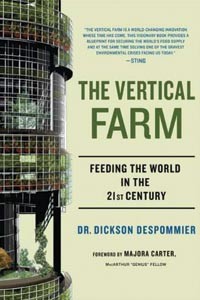In The Vertical Farm: Feeding the World in the 21st Century, Dickson Despommier trumpets what he says is the solution to a number of food-related problems. Despommier recommends a system in which vertically integrated greenhouses in urban areas host hydroponic farms, growing food locally and efficiently in small spaces.
Despommier points out that it currently takes a land area as big as the state of Virginia to produce the amount of food consumed in New York City. He notes, too, that current common agricultural practices have negative environmental effects, including the use of fossil fuels to transport food, and the polluted runoff that washes from farms treated with pesticides, contaminating the water supply. Vertical farming, he says, solves these issues: Growing is more localized, and runoff is nil, as the hydroponic system continually reuses water as it circulates.
Could it work in Pittsburgh? The idea isn't completely novel, but it hasn't been brought to fruition anywhere in the world yet. Organic farmer Greg Boulos, an advocate for sustainable agriculture, says such a proposal could take root here. "If it were to bring in ancillary industries and create jobs in the local economy, it might be a good idea," he says. But before we look at vertical farming as a panacea, he warns, we should consider the resources needed to build the facilities. ("Plastic, in the sun, has about a six-year lifespan, so [the greenhouse shell] would have to be replaced that often.")
As an initial step, Boulos suggests building on some current trends that he sees as more sustainable: rooftop gardening, and reclaiming vacant lots as neighborhood gardens, for example, or planting fruit and nut trees in already-wooded areas in the city. While not as sexy as new stacked greenhouses, such methods connect people more directly to agriculture, he argues.
"I'd like to look at it in terms of a food-cost analysis, though," Boulos says. Despommier and other researches have estimated it would be possible to grow 20 acres' worth of food on one acre of urban land -- a sizable return. While Boulos is skeptical of the quality of hydroponically grown produce versus organically farmed food, he admits that such predicted high yields are appealing. "If we get to where the same amount of food can come from 20 acres of farmland or a quarter-acre of urban land, then we're talking."



















